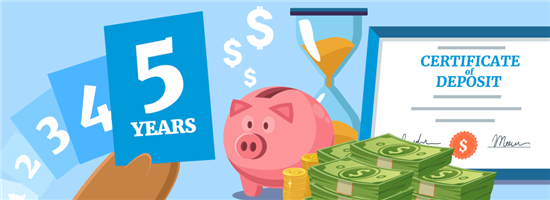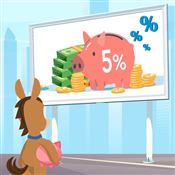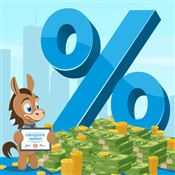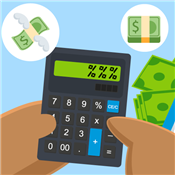Best 5 Year CD Rates for March 2024
Ad Disclosure: This article contains references to products from our partners. We may receive compensation if you apply or shop through links in our content. This compensation may impact how and where products appear on this site. You help support CreditDonkey by using our links.
Comparing 5-year CD rates? Find the perfect fit for your long-term goals.
 |
- Quontic:
60 Month CD - 3.00% APY
Where do you see yourself 5 years from now? Hopefully cashing in a hefty 5-year CD if you're looking for one today.
A long-term CD can be good to prepare for the future. But since it's for the long term, you'd want one with a high rate and maybe some convenient features.
Learn more about 5-year CDs and how you can make the most of them for your financial goals.
How Do 5-Year CDs Work?
A 5-year certificate of deposit (CD) is a deposit account where you lock in a fixed amount for a fixed 5-year term. In exchange, you also get a fixed rate that is usually higher than any regular savings account.
5-year CDs usually have higher rates because of the long-term commitment. Since it is for the long haul, the effect of compound interest will be more profound, making 5-year CDs a sensible investment for long-term goals.
How Much Interest Does A 5-Year CD Earn?
If you have $1,000 in a 5-year CD with a 3.5% APY, you can earn around $188 at maturity. With a higher APY and deposit amount, your potential earnings can be bigger. Here's a table to illustrate how much you earn:
| Rate | $1,000 | $3,000 | $5,000 | $10,000 |
|---|---|---|---|---|
| 0.00% | $1,000 | $3,000 | $5,000 | $10,000 |
| 0.50% | $1,025 | $3,076 | $5,126 | $10,253 |
| 1.00% | $1,051 | $3,153 | $5,255 | $10,510 |
| 1.50% | $1,077 | $3,232 | $5,386 | $10,773 |
| 2.00% | $1,104 | $3,312 | $5,520 | $11,041 |
| 2.50% | $1,131 | $3,394 | $5,657 | $11,314 |
| 3.00% | $1,159 | $3,478 | $5,796 | $11,593 |
| 3.50% | $1,188 | $3,563 | $5,938 | $11,877 |
| 4.00% | $1,217 | $3,650 | $6,083 | $12,167 |
| 4.50% | $1,246 | $3,739 | $6,231 | $12,462 |
| 5.00% | $1,276 | $3,829 | $6,381 | $12,763 |
| 5.50% | $1,307 | $3,921 | $6,535 | $13,070 |
Is a 5-Year CD Worth It?
Getting a 5-year CD can be worthwhile but it really depends on what your financial goal is. If you want to preserve and grow your funds, a long-term CD can be a good choice.
But, while long-term CDs are low-risk investments, they are not for everyone. A 5-year CD may not be the best option for short-term goals or emergency funds since you may need to pay penalties for early withdrawal.
Ultimately, a 5-year CD can give you better interest rates than a regular savings account, but only if you can leave your money locked up during the given timeframe.
Just make sure it is aligned with your plans and preferences before you decide.
Will 5-Year CD Rates Go Up?
Whether or not 5-year CD rates will go up depends on where the current market trend is going. CD rates usually follow the movement of the Fed Funds rate. If it goes up, CD rates can increase and vice versa.[1]
Keeping track of CD rates is a good habit if you're planning to get one. But, a good rate today may not be as attractive after a few years or even months. Thus, you might be better off with a high-yield, short-term CD than a long-term one.
You'll want to look at the big picture and see where interest rates are going when investing in 5-year CDs. Try watching the Fed Funds rate to get a feel for CD rate trends.
When interest rates are at their highest, that would be an ideal time to get a 5-year CD. But there is no guarantee that you can get the highest rate every time. Monitoring the Fed Funds rate changes can help you figure out a good time to get a CD.
Can You Lose Money on a 5-Year CD?
Usually, you won't lose money on a 5-year CD. CDs are federally insured for up to $250,000 by the FDIC or the NCUA so you have a safety net in case your bank or credit union fails.
But, the most common way to lose some earnings on your CD is by paying early withdrawal charges. Long-term CDs typically have higher penalties, worth several months of interest. If you close your CD too soon, you could lose most, if not all, of your earnings.
In general, no. Standard 5-year CDs usually require you to tie up your money until maturity. Otherwise, you will have to pay the applicable early withdrawal penalties and essentially close the CD.
Pros and Cons of a 5-year CD
To understand whether a 5-year CD is worth it, it would be best to consider the following pros and cons:
Pros
- High, guaranteed rates
5-year CDs have fixed rates that are often higher compared to savings accounts and some short-term CDs. Therefore, you get a predictable source of passive income regardless of market changes. The longer-term also lets your earnings compound more over time. - Low-risk, stable, and secure
Deposits in a 5-year CD are usually insured up to $250,000 which means you won't lose your money if your bank fails. They are also considered low-risk investments that are best for acquiring passive income or simply securing your savings. - Nurtures good savings habits
A 5-year CD can encourage good saving habits that can help you in the long run. After all, most CDs don't allow you to withdraw during the term unless you're okay with paying penalties.
Cons
- Limited flexibility
You usually can't add or withdraw money throughout a 5-year CD term. So, changes in your financial needs or investment goals might make this lack of flexibility a disadvantage. - Opportunity cost
Since you'll be committing your money for 5 years, you might not be able to take advantage of better investments or higher rates that come later on. - Inflation risk
While 5-year CDs offer some form of safety, the fixed rate might not keep up with inflation. Generally, you shouldn't invest in CDs when inflation is high.
How to Choose the Best 5-Year CD
If you're set on getting a 5-year CD, make sure you get one that best suits your long-term plans. Look at these points to help you decide:
- What is the APY?
You want to get the highest rate on a 5-year CD or any CD for that matter. Make sure you check online banks and credit unions for potentially better offerings. - Early withdrawal penalties
If you want to be prepared for situations where you'll have to close your CD early, you should look for 5-year CDs with low early withdrawal charges. You can even consider looking for no-penalty CDs to avoid paying fees altogether. - Minimum deposit requirement
If you're working with a budget, you'll want to get a 5-year CD with a deposit requirement that meets it. On the other hand, if you have a large deposit, you can check out jumbo CDs as these might give you higher rates. - Helpful features
Some CDs may have other features that could be useful. For example, bump-up and add-on CDs can offer some flexibility with your rate and deposit amount. While they may be hard to find, they do come in handy for long-term CDs.
How to maximize a 5-year CD
- Find the highest CD rate.
Try to get the most attractive CD rate within your reach. Locking a high rate is key to earning a good passive income for the next 5 years.However, take note that long-term CDs are usually not known to have very competitive rates. Instead of placing all your money in a single CD, here's what you can try.
- Use a 5-year CD in a CD ladder.
CD laddering involves dividing your funds among multiple CDs, typically with different term lengths. This will let portions of your money earn higher rates on short-term CDs.Aside from getting better rates, CDs will mature at regular intervals giving you easier access to your money. Experiment with a 5-year CD using this simple CD ladder calculator.
- Open a 5-year CD at the right time.
If managing multiple CDs is a hassle, wait for 5-year CD rates to go up instead. CD rates move with the Fed Funds rate. So if it reaches an all-time high, expect CD rates to be high too.Note that you will need to watch out for interest rate changes, and to do some research to get the best rate at the right time.
- Avoid withdrawing your CD early.
When you only want to park your money for years, simply make an effort not to withdraw your CD early. You can earn steady interest and avoid early withdrawal penalties.It's wise to allocate funds you're comfortable to tie up for a while. Keep money for spending and investing separate to minimize the temptation to dip into your CDs.
Alternatives to 5-Year CDs
A 5-year CD may not be what you need right now so here are some alternatives you can consider:
Short-Term CDs
If the idea of a CD is attractive to you but the 5-year term is holding you back, try short-term CDs. Some offer competitive rates, and you get access to your money sooner.
- Quontic:
6 Month CD - 3.75% APY - Sallie Mae Bank:
27-Month High-Yield CD - 3.75% APY - Western Alliance Bank:
3-Month High-Yield CD - 3.60% APY - CIT Bank:
13 Month CD - 3.25% APY
High-Yield Savings Accounts
Online high-yield savings accounts give you easy access to your money for daily necessities or emergencies. But unlike CDs, rates are not fixed and can change at any time.
- Raisin:
High-Yield Savings Account - Up to $1,500 Bonus - CIT Bank Platinum Savings:
$300 Bonus - Axos ONE:
Earn up to 4.31% APY - Current Savings:
Up to 4.00% bonus - Valley National Bank:
High-Yield Savings Account - 3.95% APY - Mission Valley Bank:
High Yield Savings Account - 3.86% APY - Live Oak Bank:
Personal Savings - Earn 3.80% APY - Western Alliance Bank:
High-Yield Savings Premier - 3.80% APY - Quontic:
High Yield Savings - 3.50% APY - UFB Freedom Checking & Savings:
Unlock Up to 3.46% APY
Money Market Accounts
Money market accounts are similar to savings accounts. Some include a debit card, ATM access, check-writing abilities, and easy fund access. But, the rates are not fixed and are often not as high as CD rates.
- UFB Portfolio Money Market:
Earn up to 3.26% APY
Treasury Bonds
Government-backed securities like Treasury bonds are a good option as their rates are on par with some 5-year CDs. The rates are also fixed so you don't need to worry about market changes.
Corporate Bonds
If you're willing to take a bit of risk, investing in the bonds of reputable companies can offer higher interest than government bonds. To avoid investing in the wrong company, make sure to do your research or at least check their credit ratings.
Blue Chip Stocks
Blue chips are well-established companies with a history of robust growth and generous dividends, making them great options for passive income. Liquidating your portfolio is simple (for a fee). But remember that trading stocks are a lot riskier than getting CDs.
Real Estate
Purchasing property directly or investing through real estate crowdfunding could fit nicely in a 5-year term. The risks are higher, but the rewards can come as steady rental income or as property value appreciation.
Check out real estate investing platforms like Fundrise to invest passively.
Invest in Real Estate with $10+
- Only $10 minimum investment
- Get a diversified portfolio of real estate projects across the US
- Open to all investors
5-year CD FAQs
What is a CD ladder?
A CD Ladder is a strategy where you split up your money into multiple CDs with different rates and terms. It can address the liquidity issue with 5-year CDs. With CDs maturing in intervals, you can access your money quicker and choose to reinvest it or otherwise.
To use a 5-year CD in a CD ladder, it would typically be the longest term in the ladder. Check potential returns on your 5-year CD with other CDs in a ladder using this CD Rate calculator.
Do CDs pay compound interest?
Typically, CDs pay compound interest which is reflected in its APY. However, banks and credit unions are not obliged to have their CDs pay compound interest, so some might only pay simple interest.[2]
What other CD terms are available?
CD terms can range from as short as 1 month and up to 10 years in length. However, not all banks will offer the same CD terms. If you can't find a 5-year CD in a particular bank, try shopping around other banks and credit unions.
What the Experts Say
CreditDonkey asked a panel of industry experts to answer readers' most pressing questions. Here's what they said:
Bottom Line
5-year CDs are generally a good option for long-term passive investments. Your money is secure and earnings are predictable for the next half decade.
But ultimately, you must consider your goals while choosing a long-term investment. Make sure that all bases are covered and take time to decide which option will satisfy most of your needs and preferences.
References
- ^ Bankrate. Fed's interest rate history: The federal funds rate from 1981 to the present, Retrieved 11/11/2023
- ^ Consumer Financial Protection Bureau. 1030.7 Payment of interest, Retrieved 10/27/2023
Write to Rue Atanacio at feedback@creditdonkey.com. Follow us on Twitter and Facebook for our latest posts.
Note: This website is made possible through financial relationships with some of the products and services mentioned on this site. We may receive compensation if you shop through links in our content. You do not have to use our links, but you help support CreditDonkey if you do.
Fundrise, LLC ("Fundrise") compensates CreditDonkey Inc for new leads. CreditDonkey Inc is not an investment client of Fundrise.
|
|
|





